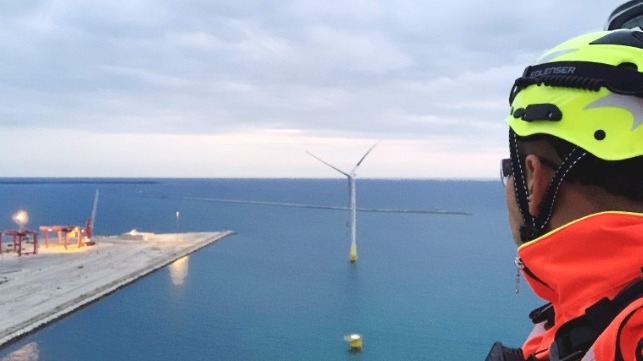Italy Inaugurates the First Offshore Wind Farm in the Mediterranean

Last Thursday, the first offshore wind farm in the Mediterranean was inaugurated off the coast of Italy.
The new Beleolico wind project is located in the Apulia region, just a few hundred yards off the Port of Taranto. The Italian offshore wind development company Renexia is the owner and developer.
The project is a small installation by modern standards, featuring just ten bottom-fixed 3.0 megawatt wind turbines supplied by China’s MingYang Smart Energy. According to the company, this is the first time a Chinese manufacturer has supplied turbines for the European offshore wind market. The turbines have a total combined capacity of 30 megawatts (MW) and an estimated output of 58,000 megawatt-hours (MWh) per year, enough to power 21,000 homes.
This project marks the start of Italy’s ambitious journey to produce over 5 GW of wind energy from offshore sites by 2040.
“Italy is determined to speed up the installation of renewable energy and increase its share in the national energy mix. Offshore energy could help secure economic opportunities for countries with large coastal areas, such as Italy, promoting local value chains,” said Italian Foreign Minister Luigi Di Maio, during the project’s inaugural ceremony at the Port of Taranto.
At the event , the Port Authority signed an agreement with Renexia for the sale of at least 220 MWh per year of the wind energy.
Renexia first proposed the project in 2008, and it secured a 25-year lease in an Italian auction in 2016.

that matters most
Get the latest maritime news delivered to your inbox daily.
At the inauguration ceremony, an environmental group Legambiente held a banner reading “Sorry, I’m Late”, protesting the years-long delay in the project's completion.
“The case of Taranto is unfortunately only the tip of the iceberg because in Italy there are many renewable projects blocked due to excessive bureaucracy from local administrations, moratoriums of the regions and protests from local committees. I hope the Beleolico project marks a turning point for renewables development in Italy with accelerated permitting processes,” said Stefano Ciafini, the national president of Legambiente.
